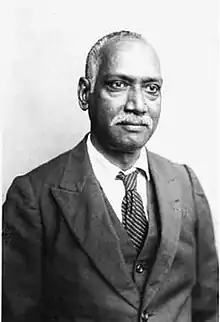Jadunath Sarkar
Sir Jadunath Sarkar CIE (10 December 1870 – 19 May 1958) was a prominent Indian historian especially of the Mughal dynasty.
Sir Jadunath Sarkar | |
|---|---|
 Jadunath Sarkar, c. 1926[1] | |
| Born | 10 December 1870 |
| Died | 19 May 1958 (aged 87) |
| Occupation | Historian |
| Spouse(s) | Lady Kadambini Sarkar |
Academic career
Sarkar was born in Karachmaria village in Natore, Bengal to Rajkumar Sarkar, the local Zamindar on 10 December 1870.[2] In 1891, he graduated in English from Presidency College, Calcutta.[2] In 1892, he topped the Master of Arts examination, in English at Calcutta University and in 1897, he received the Premchand-Roychand Scholarship.[2]
In 1893, he was inducted as a faculty of English literature at Ripon College, Calcutta (later renamed Surendranath College).[2] In 1898, he was appointed at Presidency College, Calcutta after getting selected in the Provincial Education Services.[2] In between, from 1917 to 1919, he taught Modern Indian History in Benaras Hindu University and from 1919–1923, both English and History, at Ravenshaw College, Cuttack.[2] In 1923, he became an honorary member of the Royal Asiatic Society of London. In August 1926, he was appointed as the Vice Chancellor of Calcutta University. In 1928, he joined as Sir W. Meyer Lecturer in Madras University.
Historiography
Reception
Sarkar's works faded out of public memory, with the increasing advent of Marxist and postcolonial schools of historiography.[3]
Academically, Jos J. L. Gommans compares Sarkar's work with those of the Aligarh historians, noting that while the historians from the Aligarh worked mainly on the mansabdari system and gunpowder technology in the Mughal Empire, Sarkar concentrated on military tactics and sieges.[4]
He has been called the "greatest Indian historian of his time" and one of the greatest in the world, whose erudite works "have established a tradition of honest and scholarly historiography" by E. Sreedharan.[5] He has also been compared with Theodor Mommsen and Leopold von Ranke.[5]
Honors
Sarkar was honored by Britain with a Companion of the Order of the Indian Empire CIE and knighted in the 1929 Birthday Honours list.[6] He was invested with his knighthood at Simla by the acting Viceroy, Lord Goschen, on 22 August 1929.[7]
Legacy
The Centre for Studies in Social Sciences, Calcutta, an autonomous research center, has been established in his house, which was donated to the state government by Sarkar's wife. CSSC also houses the Jadunath Bhavan Museum and Resource Centre, a museum-cum-archive of primary sources.[8]
List of works
Published works by Sarkar include:
- Economics of British India (1900)
- The India of Aurangzib (1901)
- Anecdotes of Aurangzib (1912)
- History of Aurangzib (in 5 volumes), (1912–24)
- Chaitanya's pilgrimages and teachings, from his contemporary Bengali biography, the Chaitanya-charit-amrita: Madhya-lila (translation from the Bengali original by Krishnadasa Kaviraja, 1913)
- Shivaji and his Times (1919)
- Studies in Mughal India (1919)[9]
- Mughal Administration (1920)[9]
- Nadir Shah in India (1922)
- Later Mughals by William Irvine (in 2 volumes), (edited by Jadunath Sarkar, 1922)
- India through the ages (1928)
- A Short History of Aurangzib (1930)
- The Fall of the Mughal Empire (in 4 volumes), (1932–38)
- Studies in Aurangzib's reign (1933)
- The House of Shivaji (1940)
- The History of Bengal (in 2 volumes), (1943–1948)
- Maāsir-i-ʻĀlamgiri: a history of the emperor Aurangzib-ʻl̀amgir (translation from the Persian original by Muḥammad Sāqī Mustaʻidd Khān, 1947)[10]
- Military History of India (1960)
- A History of Jaipur, c. 1503-1938 (1984)[11]
- A History Of Dasnami Naga Sanyasis
References
- Chakrabarty 2015, p. ii.
- "Sarkar, Jadunath - Banglapedia". en.banglapedia.org. Retrieved 30 November 2019.
- Kaushik Roy (2004). India's Historic Battles: From Alexander the Great to Kargil. Orient Blackswan. p. 10. ISBN 978-81-7824-109-8.
- Jos J. L. Gommans (2002). Mughal Warfare: Indian Frontiers and Highroads to Empire, 1500-1700. Psychology Press. p. 1. ISBN 978-0-415-23989-9.
- A Textbook of Historiography, 500 B.C. to A.D. 2000, E. Sreedharan, p. 448
- The London Gazette, 3 June 1929
- "Viewing Page 6245 of Issue 33539". London-gazette.co.uk. 1 October 1929. Retrieved 26 March 2014.
- "In the memory of Jadunath Sarkar". The Telegraph. Retrieved 30 November 2019.
- Moreland, W. H. (July 1921). "Studies in Mughal India by Jadunath Sarkar; Mughal Administration by Jadunath Sarkar". The Journal of the Royal Asiatic Society of Great Britain and Ireland. 3 (3): 438–439. JSTOR 25209765.
- Davies, C. Collin (April 1949). "Maāsir-i-'Ālamgīrī of Sāqī Must'ad Khān by Jadunath Sarkar". The Journal of the Royal Asiatic Society of Great Britain and Ireland. 1 (1): 104–106. JSTOR 25222314.
- Smith, John D. (1985). "Jadunath Sarkar: A History of Jaipur, c. 1503-1938". Bulletin of the School of Oriental and African Studies, University of London. 48 (3): 620. doi:10.1017/S0041977X00039343. JSTOR 618587.
Sources
- Chakrabarty, Dipesh (2015). The Calling of History: Sir Jadunath Sarkar and His Empire of Truth. University of Chicago Press. ISBN 978-0-226-10044-9.
Further reading
- Pawar, Kiram (1985). Sir Jadunath Sarkar: a profile in historiography. Books & Books.
- Sir Jadunath Sarkar commemoration volumes by Hari Ram Gupta
External links
| Wikimedia Commons has media related to Jadunath Sarkar. |
| Wikiquote has quotations related to: Jadunath Sarkar |
- Ray, Aniruddha (2012). "Sarkar, Jadunath". In Islam, Sirajul; Jamal, Ahmed A. (eds.). Banglapedia: National Encyclopedia of Bangladesh (Second ed.). Asiatic Society of Bangladesh.
- Sir Sarkar at Britannica Encyclopedia
- Works by Jadunath Sarkar at Project Gutenberg
- Works by or about Jadunath Sarkar at Internet Archive